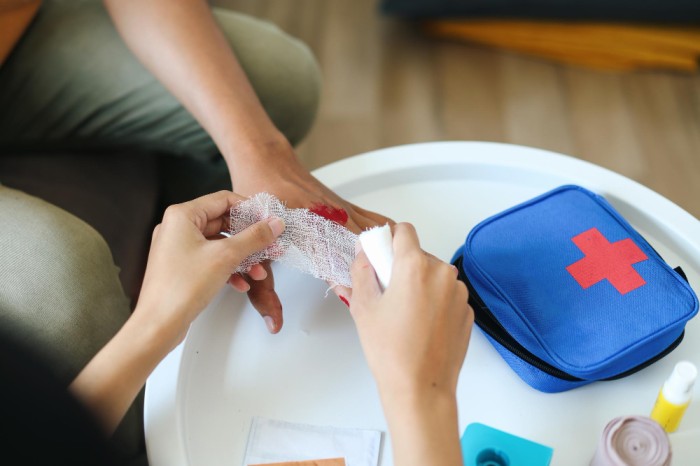First Aid: What to Do in Common Medical Emergencies
Home > Blog > Sports Injuries > First Aid: What to Do in Common Medical Emergencies
Medical emergencies can happen anywhere, anytime, and knowing basic first aid can make a significant difference in saving lives. At Sri Naadi Hospital, we believe that everyone should have a basic understanding of first aid to provide immediate care before professional help arrives. In this blog, we’ll guide you through essential first aid steps for common medical emergencies.
Heart Attack
A heart attack occurs when blood flow to the heart is blocked, often leading to chest pain, shortness of breath, and discomfort in the arms, neck, or jaw. If you suspect someone is having a heart attack, keep them calm and call for emergency medical help immediately. Loosen any tight clothing and encourage them to chew an aspirin (unless allergic) to help thin the blood. If they become unresponsive, perform CPR until medical professionals arrive.
Stroke
A stroke happens when blood supply to the brain is disrupted. Quick action is crucial to minimize brain damage. Use the FAST test to identify a stroke:
- Face drooping
- Arm weakness
- Speech difficulty
- Time to call emergency services
Keep the person comfortable and do not give them anything to eat or drink. Seek immediate medical attention, as early treatment can prevent severe complications.
Choking
Choking occurs when an object blocks the airway, making it difficult to breathe. If someone is choking and unable to cough or speak, perform the Heimlich manoeuvreby standing behind them, placing your hands above their navel, and giving quick, upward thrusts until the object is expelled.
Bleeding
For minor cuts, clean the wound with water and apply pressure with a clean cloth to stop the bleeding. For severe bleeding, apply firm, direct pressure with a bandage or cloth and elevate the injured area if possible. Avoid removing embedded objects—leave that to medical professionals. Seek immediate medical care if the bleeding does not stop or if the wound is deep.
Burns
For minor burns, run cool water over the affected area for at least 10 minutes, then cover it with a clean, non-stick dressing. Avoid applying ice, butter, or toothpaste, as these can worsen the injury. For severe burns that cause blisters, charring, or significant pain, do not remove burned clothing and seek emergency medical help immediately
Fractures and Sprains
If you suspect a broken bone, keep the injured limb still and avoid unnecessary movement. Apply an ice pack to reduce swelling and use a splint or support to stabilize the area. Do not attempt to realign a broken bone. For sprains, follow the RICE method—Rest, Ice, Compression, and Elevation—to minimize swelling and pain. Seek medical attention for fractures and severe sprains.
Seizures
During a seizure, help the person lie down on their side to prevent choking. Remove any nearby objects that could cause injury, but do not try to restrain them. Do not place anything in their mouth. Stay with them and call for medical help if the seizure lasts longer than five minutes, if they have difficulty breathing, or if it’s their first seizure.
Unconsciousness & CPR
If someone collapses and is unresponsive, check for breathing and a pulse. If they are not breathing, begin CPR by giving 30 chest compressions followed by two rescue breaths. Continue CPR until medical help arrives.
Be Prepared, Save Lives
Basic first aid knowledge can make a crucial difference in emergencies. Knowing what to do can prevent complications, reduce pain, and even save lives. At Sri Naadi Hospital, we encourage everyone to learn basic first aid skills and be prepared for any situation. In case of any medical emergency, seek professional help immediately. Being informed and acting quickly can make all the difference!
Recent Comments
Recent Posts
-
 Common Sports Injuries
12-Mar-2025
Common Sports Injuries
12-Mar-2025
-
 Why Regular Dental Checkups Matter
11-Mar-2025
Why Regular Dental Checkups Matter
11-Mar-2025
-
 First Aid: What to Do in Common Medical Emergencies
11-Mar-2025
First Aid: What to Do in Common Medical Emergencies
11-Mar-2025
-
 24/7 State-of-the-Art ICU: Life-Saving Care for You at Sri Naadi Hospital
18-Jul-2024
24/7 State-of-the-Art ICU: Life-Saving Care for You at Sri Naadi Hospital
18-Jul-2024
-
 Invisible Aligners for A Perfect Smile
07-Jun-2024
Invisible Aligners for A Perfect Smile
07-Jun-2024







Recent Comments